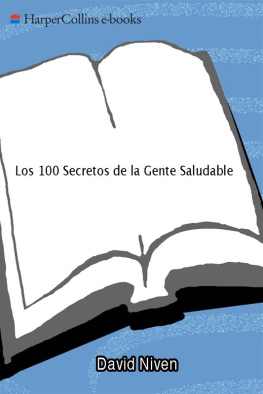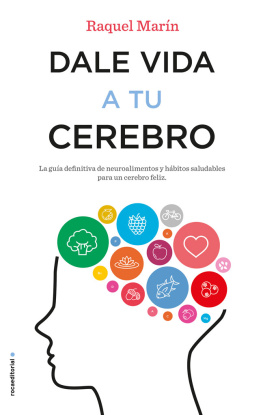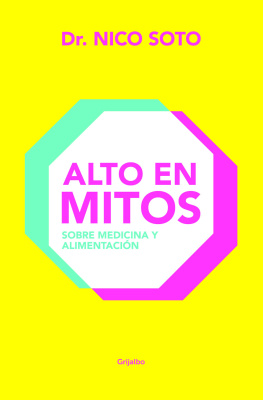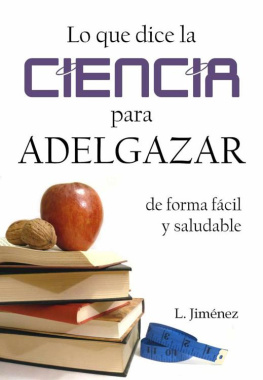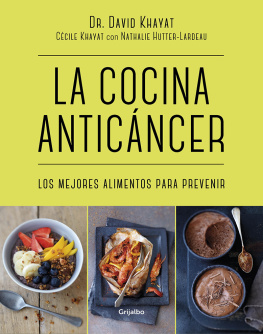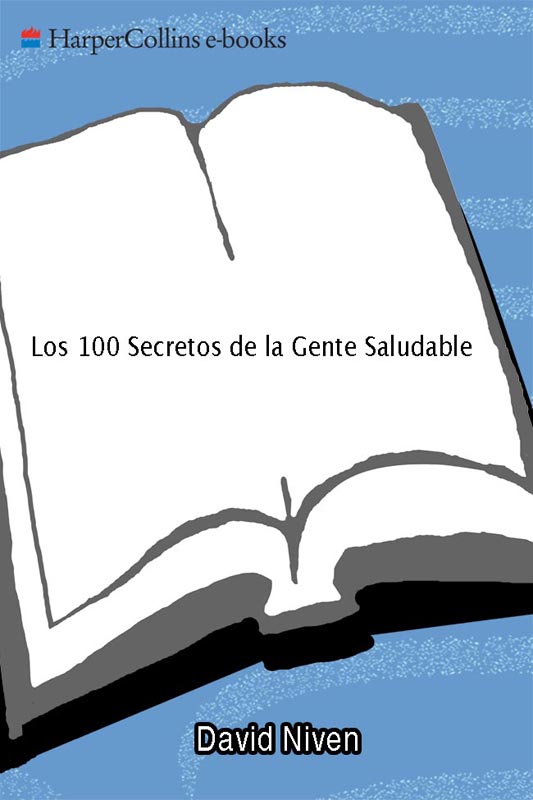DAVID NIVEN, PH.D., es el autor de los bestsellers internacionales Los 100 Secretos de la Gente Feliz, Los 100 Secretos de la Gente Exitosa, y Los 100 Secretos de las Parejas Felices. Es psicólogo y científico social y enseña en la Florida Atlantic University.
“100 Million Americans Live with Aching Backs.” 2002. Spine.
“Age Affects Taste of Vegetables.” 2003. Universidad de Washington, Seattle, Washington.
“Air Pollution Linked to Increased Medical Care and Costs for Elderly.” 2002. Health Affairs.
“Airport Noise Impairs Long-Term Memory and Reading.” 2002. Psychological Science.
“Allergies Interfere with Life.” 2002. American College of Allergy, Asthma, and Immunology, Arlington Heights, Illinois.
“An Aspirin a Day to Keep Cancer Away?” 2002. Clínica Mayo, Rochester, Minnesota.
“Breathing and Blood Flow.” 2003. Universidad de Harvard, Cambridge, Massachusetts.
“Caffeine-Signaling Activity in Brain Function.” 2002. Nature.
“Can Forgiveness Make the Immune System Stronger?” 2002. Universidad de Maryland, College Park, Maryland.
“Checklist of Claims May Signal Trouble on Internet Cancer-Treatment Sites.” 2003. Psychosomatics.
“Choosing the Right Drink for Fluid Replacement.” 2002. Geisinger-Wyoming Valley Human Motion Institute, Wilkes-Barre, Pennsylvania.
“Columbine News Coverage Misled Nation Down Fearful Road.” 2003. Universidad de Purdue, West Lafayette, Indiana.
“Common Painkiller May Hinder Aspirin’s Effects.” 2002. Clínica Mayo, Rochester, Minnesota.
“Commonly Used Medicines May Delay or Prevent Alzheimer’s Disease.” 2002. Neurology .
“Connection Between Personality, Death Among Chronically Ill.” 2002. Health Psychology.
“Distance to Treatment Center and Mastectomy vs. Lumpectomy.” 2003. International Journal Radiation Oncology, Biology, and Physics.
“Effects of Dogs and Cats on Health.” 2002. Journal of the American Medical Association.
“Effects of Contact on Stress.” 2003. Universidad de Carolina del Norte, Chapel Hill, Carolina del Norte.
“Effects of Sleep Deficiency.” 2003. National Sleep Foundation, Washington, DC.
“Effects of Time-Release Vitamins.” 2003. Universidad de Tufts, Boston, Massachusetts.
“Effects on Cognitive Ability of Sedentary Lifestyle.” 2003. Universidad de Illinois, Champaign-Urbana, Illinois.
Exposing Anti-Aging Propaganda.” 2003. Universidad de Illinois, Chicago, Illinois.
“Fertility and the Mountain Biker.” 2002. University Hospital, Innsbruck, Austria.
“Fire Deaths Without Smoke Detectors.” 2002. Centers for Disease Control, Atlanta, Georgia.
“Fit Seniors Better Able to React When Quick Thinking Needed.” 2002. American College of Sports Medicine.
“Fitness Can Be Free.” 2002. Universidad de Richmond, Richmond, Virginia.
“Foods Rich in Folate May Reduce Risk of Stroke.” 2002. Stroke: Journal of the American Heart Association.
“Fourth of July Safety Advice.” 2002. American Academy of Orthopaedic Surgeons, Rosemont, Illinois.
“Ginkgo Fails to Aid Memory in Double-Blind Study.” 2002. Journal of the American Medical Association.
“Half of Heart Attack Patients Drive to Hospital.” 2002. Circulation: Journal of the American Heart Association.
“Health and Nutritional Differences Between Organic Foods and Traditionally Grown Foods.” 2003. Universidad de Michigan, Ann Arbor, Michigan.
“Health Benefits of Moderate Drinking May Not Apply to African-Americans.” 2003. Alcoholism: Clinical and Experimental Research.
“High Hostility May Predict Heart Disease More than Other Risk Factors.” 2002. Health Psychology.
“Home Injury Found to Be a Major Cause of Deaths.” 2002. Universidad de Carolina del Norte, Chapel Hill, Carolina del Norte.
“Household Mold Scares: Small Amounts Not a Big Health Concern.” 2003. Clínica Mayo, Rochester, Minnesota.
“Ideal Body Images. “ 2002. U.S. Department of Health and Human Services, Washington, DC.
“Insect Repellent Study Reveals Widely Varied Protection Levels.” 2002. New England Journal of Medicine.
“Involuntary Smoke Exposure Affects Asthma Severity Among Children.” 2002. Chest.
“Jogging Every Day May Keep Alzheimer’s Away.” 2002. Trends in Neurosciences.
“Journal Writing Can Alleviate Illnesses.” 1999. Journal of the American Medical Association.
“Large Doses of Vitamins and Minerals May Put Prostate Cancer Patients at Risk.” 2002. International Journal of Radiation Oncology, Biology, and Physics.
“Lawn Mower Safety Could Save Life and Limb This Summer.” 2003. Universidad de Michigan, Ann Arbor, Michigan.
“Link Between Grape Juice Consumption and Lowered Risk of Heart Trouble.” 2003. Journal of the American Heart Association.
“Little ‘Weekend Effect’ Related to Intensive Care Admissions.” 2002. Medical Care.
“Lonely People Face Higher Risk of Heart Disease.” 2002. Psychosomatic Medicine.
“Low Vitamin C Intake Linked with Stroke Risk.” 2002. Stroke: Journal of the American Heart Association.
“Majority of U.S. Adults Have Some Health Problems.” 2002. American Journal of Health Promotion.
“Managing Fatigue.” 2002. Clínica Mayo, Rochester, Minnesota.
“Many Young Americans Risk Skin Cancer from Annual Sunburns.” 2002. American Journal of Preventive Medicine.
“Medical Residents Fail to Perform Self Exams.” 2003. Medical College of Georgia, Augusta, Georgia.
“Meditation Effects on Immne System.” 2003. University of Wisconsin, Madison, Wisconsin.
“Memory Isn’t Lost–Just out of Sync.” 2002. Universidad de Arkansas, Fayetteville, Arkansas.
“More Exercise, Less Smoking May Extend, Enhance Life Even at Advanced Age.” 2002. Psychosomatic Medicine.
“More Health Care Doesn’t Equal Better Health Care.” 2003. Annals of Internal Medicine.
“Most Golf ‘Yippers’ Perceive Symptoms as Physical, not Psychological.” 2003. Clínica Mayo, Rochester, Minnesota.
“Mothers Who Lose Weight After the Birth of Their First Child Have a ‘Can Do’ Attitude.” 2001. Journal of the American Dietetic Association.
“Nearness of Supermarkets Boosts People’s Intake of Nutritious Fruits, Vegetables.” 2002. American Journal of Public Health.
“New Food -Addiction Link Found.” 2002. Synapse.
“One-on-One with Pharmacists Gives Patients Medication Advantage.” 2002. American Journal of Health-System Pharmacy.
“Only 5 to 10 Percent of Cancers Are Inherited.” 2002. Clínica Mayo, Rochester, Minnesota.
“Physicians Honor Patient Requests for Advertised Drugs.” 2002. Food and Drug Administration, Washington, DC.
“Piercing Your Ears? Stick to the Lobes.” 2002. Presented at the Annual Meeting of the Infectious Diseases Society of America.
“Poor Sleep Linked to Earlier Death in Older Adults.” 2003. Psychosomatic Medicine.
“Preventing Food-Borne Illness When Cooking and Eating Outdoors.” 2002. Cedars-Sinai Medical Center, Los Ángeles, California.
“Regular Soap Safer than Antibacterial Soap.” 1999. Hackensack University Medical Center, Hackensack, Nueva Jersey.
“Religiosity Effect on Mental Health.” 2003. Universidad de Columbia, Nueva York, Nueva York.
“Researchers Link Red Wine to ‘Good Cholesterol.’” 2002. Alcoholism: Clinical and Experimental Research.
“Sense of Control Eases Physical Toll of Stressful Situation.” 2002. Psychophysiology.
“Sex Discrimination in Your Medicine Cabinet.” 2002. Society for Women’s Health Research in Washington, DC.

